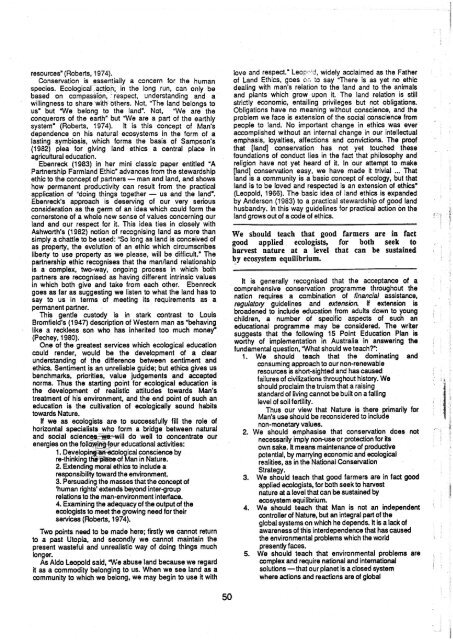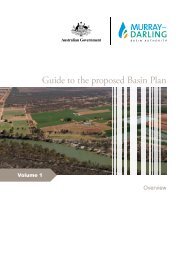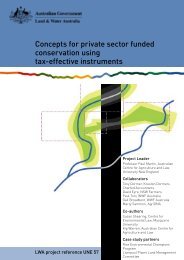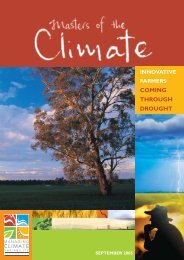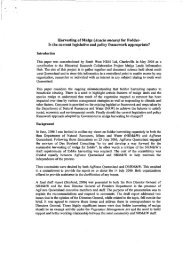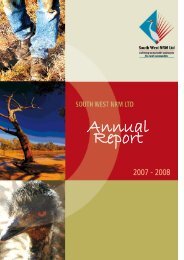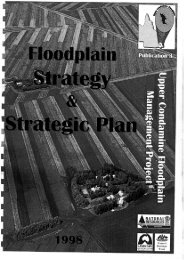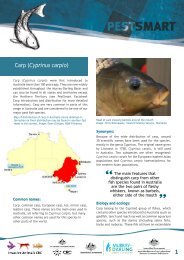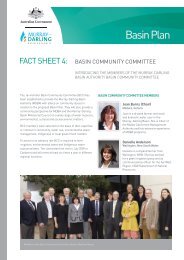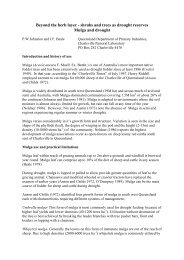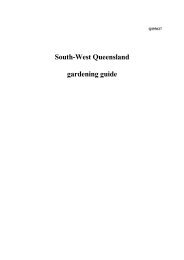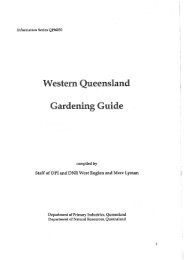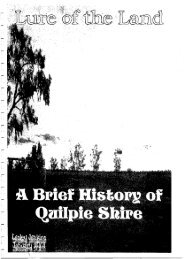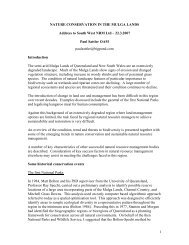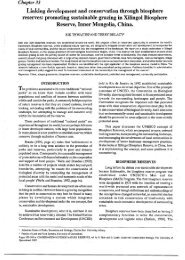soil-conservation-people-religion-and-land.pdf - South West NRM
soil-conservation-people-religion-and-land.pdf - South West NRM
soil-conservation-people-religion-and-land.pdf - South West NRM
You also want an ePaper? Increase the reach of your titles
YUMPU automatically turns print PDFs into web optimized ePapers that Google loves.
esources" (Roberts, 1974).<br />
Conservation is esseflhlly a concern for the human<br />
species. EcologicalTactio~; in the long run, can only be<br />
based on compas%lin, - respect, underst<strong>and</strong>ing <strong>and</strong> a<br />
willingness to share witKoathers. Not, "The l<strong>and</strong> belongs to<br />
us" but "We belong to the l<strong>and</strong>". Not, "We are the<br />
conquerors of the earth" but "We are a part of the earthly<br />
system" (Roberts, 1974).<br />
It is this concept of Man's<br />
dependence on his natural ecosystems in the form of a<br />
lasting symbiosis, which forms the basis of Sampson's<br />
(1982) plea for giving l<strong>and</strong> ethics a central place in<br />
agricultural education.<br />
Ebenreck (1983) in her mini classic paper entitled "A<br />
Partnership Farml<strong>and</strong> Et hic" advances from the stewardship<br />
ethic to the concept of partners - man <strong>and</strong> l<strong>and</strong>, <strong>and</strong> shows<br />
how permanent productivity can result from the practical<br />
application of "doing things together - us <strong>and</strong> the l<strong>and</strong>".<br />
Ebenreck's approach is deserving of our very serious<br />
consideration as the germ of an idea which could form the<br />
cornerstone of a whole new sense of values concerning our<br />
l<strong>and</strong> <strong>and</strong> our respect for it. This idea ties in closely with<br />
Ashworth's (1982) notion of recognising l<strong>and</strong> as more than<br />
simply a chattle to be used: "So long as l<strong>and</strong> is conceived of<br />
as property, the evolution of an ethic which circumscribes<br />
liberty to use property as we please, will be difficult." The<br />
partnership ethic recognises that the mann<strong>and</strong> relationship<br />
is a complex, two-way, ongoing process in which both<br />
partners are recognised as tiaviig different intrinsic values<br />
in which both give <strong>and</strong> take from each other. Ebenreck<br />
goes as far as suggesting we listen to what the l<strong>and</strong> has to<br />
say to us in terms of meeting its requirements as a<br />
permanent partner.<br />
This gentle custody is in stark contrast to Louis<br />
Bromfield's (1 947) description of <strong>West</strong>ern man as "behaving<br />
like a reckless son who has inherited too much money"<br />
(Pechey, 1980).<br />
One of the greatest services which ecological education<br />
could render, would be the development of a clear<br />
underst<strong>and</strong>ing of the difference between sentiment <strong>and</strong><br />
ethics. Sentiment is an unreliable guide; but ethics gives us<br />
benchmarks, priorities, value judgements <strong>and</strong> accepted<br />
norms. Thus the starting point for ecological education is<br />
the development of realistic attitudes towards Man's<br />
treatment of his environment, <strong>and</strong> the end point of such an<br />
education is the cultivation of ecologically sound habits<br />
towards Nature.<br />
If we as ecologists are to successfully fill the role of<br />
horizontal specialists who form a bridge between natural<br />
<strong>and</strong> social scienc~~ill do well to concentrate our<br />
energies on the follwmr educational activities:<br />
1. Developi~lo ical conscience by<br />
re-thinking tm organ in Nature.<br />
2. Extending moral ethics to include a<br />
responsibility toward the environment.<br />
3. Persuading the masses that the concept of<br />
'human rights' extends beyond intergroup<br />
relations to the man-environment interface.<br />
4. Examining the adequacy of the output of the<br />
ecologists to meet the growing need for their<br />
services (Roberts, 1974).<br />
love <strong>and</strong> respect." Leap. id, widely acclaimed as the Father<br />
of L<strong>and</strong> Ethics, goes ors ro say 'There is as yet no ethic<br />
dealing with man's relation to the l<strong>and</strong> <strong>and</strong> to the animals<br />
<strong>and</strong> plants which grow upon it. The l<strong>and</strong> relation is still<br />
strictly economic, entailing privileges but not obligations.<br />
Obligations have no meaning without conscience, <strong>and</strong> the<br />
problem we face is extension of the social conscience from<br />
<strong>people</strong> to l<strong>and</strong>. No important change in ethics was ever<br />
accomplished without an internal change in our intellectual<br />
emphasis, loyalties, affections <strong>and</strong> convictions. The proof<br />
that [l<strong>and</strong>] <strong>conservation</strong> has not yet touched these<br />
foundations of conduct lies in the fact that philosophy <strong>and</strong><br />
<strong>religion</strong> have not yet heard of it. In our attempt to make<br />
[l<strong>and</strong>] <strong>conservation</strong> easy, we have made it trivial ... That<br />
l<strong>and</strong> is a community is a basic concept of ecology, but that<br />
l<strong>and</strong> is to be loved <strong>and</strong> respected is an extension of ethics"<br />
(Leopold, 1966). The basic idea of l<strong>and</strong> ethics is exp<strong>and</strong>ed<br />
by Anderson (1983) to a practical stewardship of good l<strong>and</strong><br />
husb<strong>and</strong>ry. In this way guidelines for practical action on the<br />
l<strong>and</strong> grows out of a code of ethics.<br />
We should teach that good farmers are in fact<br />
good applied ecologists, for both seek to<br />
harvest nature at a level that can be sustained<br />
by ecosystem equilibrium.<br />
It is generally recognised that the acceptance of a<br />
comprehensive <strong>conservation</strong> programme throughout the<br />
nation requires a combination of financial assistance,<br />
regulatory guidelines <strong>and</strong> extension. If extension is<br />
broadened to include education from adults down to young<br />
children, a number of specific aspects of such an<br />
educational programme may be considered. The writer<br />
suggests that the following 15 Point Education Plan is<br />
worthy of implementation in Australia in answering the<br />
fundamental question, "What should we teach?":<br />
1. We should teach that the dominating <strong>and</strong><br />
consuming approach to our non-renewable<br />
resources is short-sighted <strong>and</strong> has caused<br />
failures of civilizations throughout history. We<br />
should proclaim the truism that a raising<br />
st<strong>and</strong>ard of living cannot be built on a falling<br />
level of <strong>soil</strong> fertility.<br />
Thus our view that Nature is there primarily for<br />
Man's use should be reconsidered to ~nclude<br />
non-monetary values.<br />
2. We should emphasis8 that <strong>conservation</strong> does not<br />
necessarily imply non-use or protection for its<br />
own sake. It means maintenance of productive<br />
potential, by marrying economic <strong>and</strong> ecological<br />
realities, as in the National Conservation<br />
Strategy.<br />
3. We should teach that good farmers are in fact good<br />
applied ecologists, for both seek to harvest<br />
nature at a level that can be sustained by<br />
ecosystem equilibrium.<br />
4. We should teach that Man is not an independent<br />
controller of Nature, but an integral part of the<br />
alobal svstems on which he depends. It is a lack of<br />
awareness of this interdependence that has caused<br />
the environmental problems which the world<br />
presently faces.<br />
Two points need to be made here; firstly we cannot return<br />
to a past Utopia, <strong>and</strong> secondly we cannot maintain the<br />
present wasteful <strong>and</strong> unrealistic way of doing things much<br />
longer. 5. We should teach that environmental problems are<br />
As Aldo Leopold said, "Vl'e abuse l<strong>and</strong> because we regard<br />
complex <strong>and</strong> require national <strong>and</strong> international<br />
it as a commodity belonging to us. When we see l<strong>and</strong> as a<br />
solutions -that our planet is a closed system<br />
community to which we belong, we may begin to use it with<br />
where actions <strong>and</strong> reactions are of global


